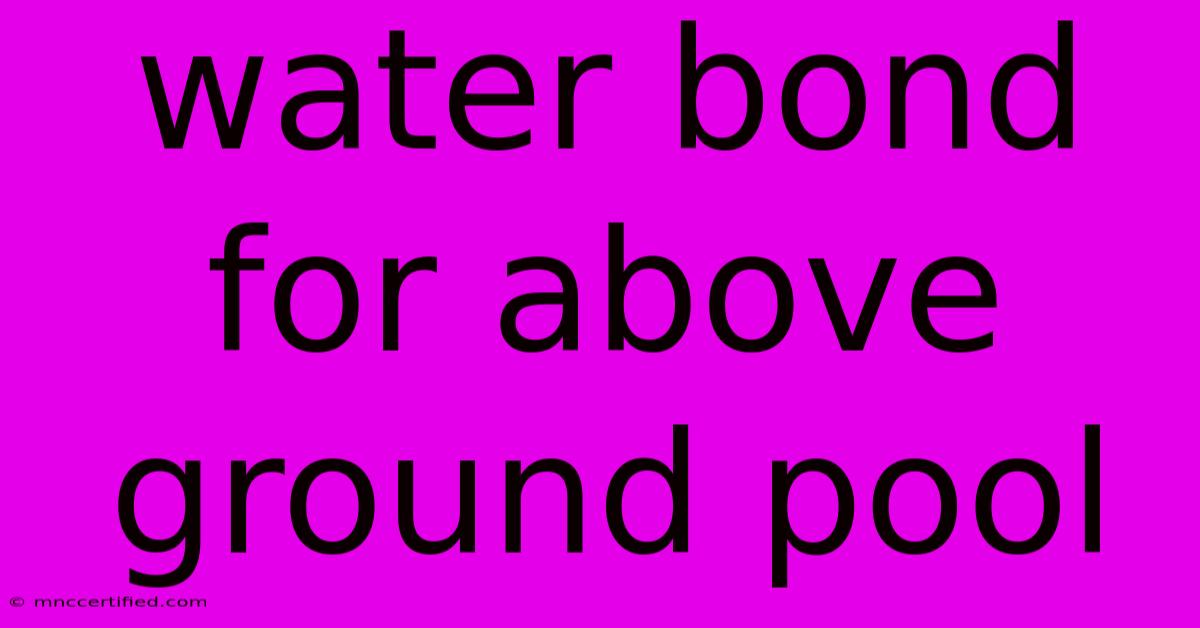Water Bond For Above Ground Pool

Table of Contents
Water Bond for Above Ground Pools: A Comprehensive Guide
Choosing the right water bond for your above ground pool is crucial for maintaining a clean, safe, and enjoyable swimming experience. This comprehensive guide will explore the importance of water chemistry, explain what a water bond is (and isn't), and help you understand how to achieve optimal pool water balance. We'll also address common misconceptions and provide practical tips for maintaining your above ground pool.
Understanding Your Above Ground Pool's Water Chemistry
Before diving into water bonds, let's clarify the fundamentals of pool water chemistry. Maintaining proper balance is vital to prevent algae growth, corrosion of your pool equipment, and skin irritation. Key factors include:
- pH: This measures the acidity or alkalinity of your water. The ideal range is typically between 7.2 and 7.8. An imbalance can affect the effectiveness of sanitizers and lead to scaling or corrosion.
- Alkalinity: This refers to the water's ability to resist pH changes. Maintaining proper alkalinity helps stabilize the pH level. The ideal range is generally between 80 and 120 ppm.
- Calcium Hardness: This indicates the amount of dissolved calcium in your water. Low calcium hardness can lead to etching of the pool surface, while high levels can cause scaling. The ideal range depends on your pool's surface material but typically falls between 200 and 400 ppm.
- Sanitizer Levels: Chlorine or bromine are commonly used to sanitize pool water, killing bacteria and algae. Maintaining the correct sanitizer level is essential for a clean and healthy pool.
What is a "Water Bond" (and what it isn't)?
The term "water bond" is often used informally, sometimes incorrectly, within the context of above ground pools. It doesn't refer to a specific chemical product but rather represents the overall balance and harmony of your pool water's chemical parameters. A "well-bonded" pool essentially means that the pH, alkalinity, and calcium hardness are all within their optimal ranges, working together to create a stable and healthy swimming environment.
It's NOT a single product you can buy. There's no magic "water bond" chemical that instantly solves all your pool water problems. Achieving a well-bonded pool requires consistent testing and adjustments using various chemicals to balance the different parameters.
Achieving a Well-Balanced Pool: A Step-by-Step Guide
Achieving the ideal "water bond" for your above ground pool involves a systematic approach:
-
Regular Testing: Use a reliable test kit (liquid tests are generally more accurate than test strips) to regularly check your pool water's pH, alkalinity, calcium hardness, and sanitizer levels. Frequency depends on factors like pool usage and weather conditions – aim for at least once a week.
-
Adjusting Chemicals: Based on your test results, use appropriate pool chemicals to adjust the levels of pH, alkalinity, and calcium hardness to their ideal ranges. Always add chemicals slowly and carefully, following the manufacturer's instructions. Never mix chemicals together.
-
Circulation and Filtration: Ensure your pool pump and filter are running adequately to circulate the water and remove debris. Proper filtration is essential for maintaining clean and balanced water.
-
Shock Treatment: Periodically shock your pool to eliminate contaminants and maintain proper sanitizer levels. Follow the instructions on your chosen shock product carefully.
-
Regular Cleaning: Regularly clean your pool, removing leaves, debris, and other contaminants. This helps prevent imbalances and reduces the workload on your filtration system.
Common Misconceptions about Above Ground Pool Water Chemistry
-
"My pool is cloudy, so I need a water bond." Cloudiness usually indicates an imbalance in one or more of the key chemical parameters, requiring specific adjustments, not a generalized "bond."
-
"One-time treatment will solve all problems." Maintaining optimal pool chemistry is an ongoing process requiring regular testing and adjustment. There's no one-time fix for water imbalances.
-
"Higher chemical levels are better." Excessive chemical levels can be harmful to swimmers and damaging to your pool equipment. Always follow recommended ranges.
Conclusion: Maintaining Your Above Ground Pool's Water Bond
Maintaining a well-balanced "water bond" in your above ground pool is essential for a safe, enjoyable, and cost-effective swimming experience. By understanding the importance of regular testing, careful chemical adjustments, and diligent maintenance, you can create and maintain a pristine swimming environment for years to come. Remember, consistent monitoring and proactive adjustments are key to achieving and maintaining that perfect chemical balance for your above-ground pool.

Thank you for visiting our website wich cover about Water Bond For Above Ground Pool. We hope the information provided has been useful to you. Feel free to contact us if you have any questions or need further assistance. See you next time and dont miss to bookmark.
Featured Posts
-
Line Of Sight Insurance Law Ohio
Nov 21, 2024
-
31 20 An Hour Is How Much A Year
Nov 21, 2024
-
Fortnite 32 11 Update Server Maintenance
Nov 21, 2024
-
Kd Tp Swap Delicious Crypto News
Nov 21, 2024
-
Laser Mohs Dermatology Insurance
Nov 21, 2024